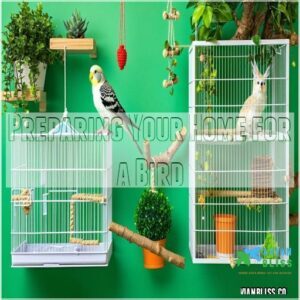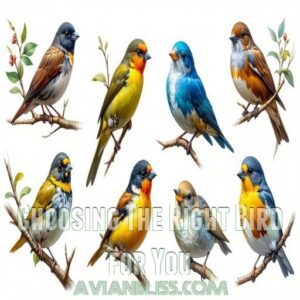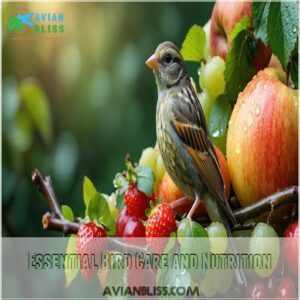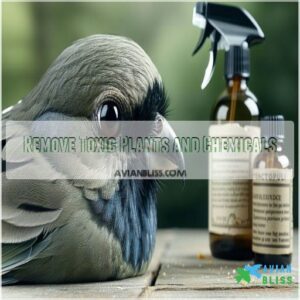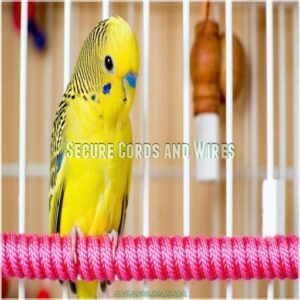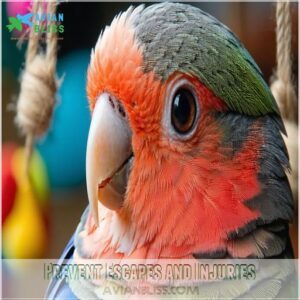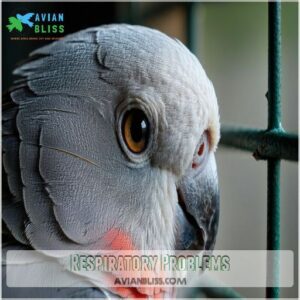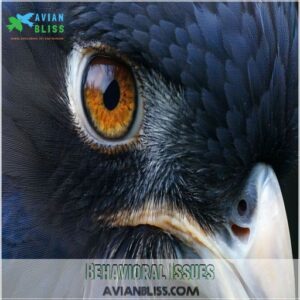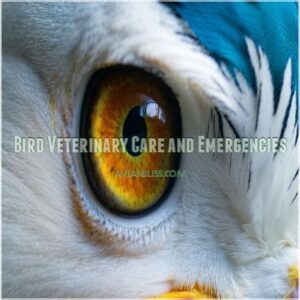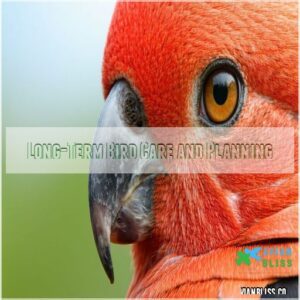This site is supported by our readers. We may earn a commission, at no cost to you, if you purchase through links.

First, find an avian specialist who understands your feathered friend’s unique needs.
Schedule regular check-ups to catch any health issues early, and keep an eye out for subtle changes in behavior or appearance.
Remove toxic household items, secure your bird’s environment, and provide a balanced diet rich in nutrients.
Learn to recognize signs of illness, like respiratory problems or feather changes. Don’t skimp on preventative care – your bird’s health depends on your proactive approach.
Think of yourself as a bird detective, always ready to solve the mystery of your pet’s well-being. Your bird’s health depends on proactive approach. Avian specialist is crucial.
Table Of Contents
- Key Takeaways
- Preparing Your Home for a Bird
- Choosing The Right Bird for You
- Essential Bird Care and Nutrition
- Creating a Safe Environment for Your Bird
- Bird Health and Veterinary Care
- Building a Strong Bond With Your Bird
- Common Health Issues in Birds
- Bird Veterinary Care and Emergencies
- Maintaining Your Bird’s Mental Health
- Long-Term Bird Care and Planning
- Frequently Asked Questions (FAQs)
- How do I Keep my Bird healthy?
- How to take care of a bird before bringing home?
- How to keep your pet bird happy?
- How do you care for a feathered bird?
- Do pet birds need veterinary care?
- What should I do if my pet bird eats my house?
- How often should a bird go to the vet?
- What routine care does a bird need?
- Is it worth taking bird to vet?
- How do vets handle birds?
- Conclusion
Key Takeaways
- You’ll need to find a specialized avian veterinarian who understands your bird’s unique health needs and can provide comprehensive care through regular check-ups and preventative monitoring.
- Your bird’s health depends on creating a safe home environment by removing toxic items, securing potential hazards, and bird-proofing your living space to prevent accidents and injuries.
- You’ll want to provide a balanced diet rich in high-quality pellets, fresh fruits and vegetables, and essential minerals like calcium to support your feathered friend’s long-term wellness and nutritional needs.
- You must stay vigilant about recognizing early signs of illness, such as changes in behavior, respiratory issues, or feather conditions, and be prepared to act quickly to address potential health concerns.
Preparing Your Home for a Bird
Before bringing home a feathered companion, you’ll need to transform your living space into a bird-friendly sanctuary that prioritizes safety and comfort.
Take time to remove potential hazards like toxic plants, secure loose wires, and create a welcoming environment where your new bird can thrive without risks.
Get Rid of Potentially Harmful Household Items
At least three toxic household items could be silently threatening your bird’s health right now.
Ditch non-stick Teflon cookware, which releases deadly fumes when heated.
Swap out harsh chemical cleaners for bird-friendly alternatives.
Eliminate scented candles, air fresheners, and aerosol sprays that can wreak havoc on your feathered friend’s delicate respiratory system.
Familiarize Yourself With Bird-Proofing
How can you transform your home into a bird-safe haven?
Bird-proofing isn’t just a checklist—it’s creating a sanctuary that protects your feathered friend.
Install safe perches, use cord covers, remove toxic plants, and secure window guards.
Escape-proof cages are essential for preventing accidents.
Your diligence in bird-proofing shows your commitment to your pet’s safety and well-being.
Choose a Safe Location for The Cage
After bird-proofing your space, finding the perfect cage location becomes your next mission. Your feathered friend needs a sanctuary that balances comfort and safety.
Consider these key placement guidelines:
- Keep away from kitchen fumes and direct sunlight
- Avoid drafty windows and air conditioning vents
- Position in a high-traffic area for social interaction
- Maintain a stable temperature between 65-80 degrees
- Select a spot with natural light and quiet zones
Choosing The Right Bird for You
Choosing the right bird is like finding a lifelong companion that’ll chirp its way into your heart.
From parakeets to cockatiels, each feathered friend has a unique personality.
So you’ll want to research species carefully to match your lifestyle and expectations.
Consider Bird Size and Temperament
Not all birds come in one-size-fits-all packages.
Your bird’s size directly impacts its housing needs, social requirements, and training methods.
Smaller birds like budgies might thrive in compact spaces, while larger parrots demand substantial room and attention. When choosing your feathered companion, consider your living space, lifestyle, and the bird’s unique temperament to guarantee a perfect match.
Research Different Bird Species
Since bird size isn’t the whole story, dig deeper into species research to find the perfect match for your lifestyle and consult with an exotic bird vet who can help you choose the right products from an exotic bird vet store like products for exotic bird vet.
Parakeets, cockatiels, and finches each bring unique personalities to the table.
Check their temperament, diet needs, and housing requirements.
Smaller birds like parrotlets may charm you, while larger parrots demand more attention.
An exotic bird vet can help you match the perfect feathered friend to your lifestyle.
Understand The Cost of Bird Ownership
Owning a bird isn’t just about the initial purchase—it’s a financial journey that catches many pet owners off guard.
Bird ownership comes with hidden price tags: unexpected vet bills, specialized cage setups, ongoing food expenses, and enrichment toys.
Your feathered friend will need consistent avian veterinary care, which can quickly add up over their potentially decades-long lifespan.
Essential Bird Care and Nutrition
Your bird’s health starts with what goes into its beak, so understanding nutrition is essential for keeping your feathered friend happy and thriving.
From colorful fruits and vegetables to essential calcium supplements, you’ll learn how to craft a balanced diet.
That’ll have your bird chirping with joy and vitality.
Provide a Balanced Diet
Your bird’s diet is the cornerstone of its health, with three critical components that’ll make your feathered friend sing with joy.
- Ditch the all-seed diet like a bad habit and embrace high-quality pellets
- Mix in carefully chosen dietary supplements to fill nutritional gaps
- Customize your bird’s menu with species-specific pellet types that match their unique needs
Mastering bird nutrition means understanding each bite counts for vibrant, long-lasting wellness.
Offer Fresh Fruits and Vegetables
Want to spice up your bird’s diet? Fresh fruits and veggies are nature’s multivitamins!
Start with safe picks like carrots, leafy greens, and berries.
A balanced diet for canaries should also include Finest Bird Food Options that provide essential vitamins and minerals.
Chop them into tiny, bird-friendly pieces to prevent choking.
Watch for picky eaters and introduce new foods gradually.
Mix up seasonal choices to keep mealtime exciting and nutritionally balanced for your feathered friend.
Importance of Calcium and Minerals
Bridging the nutritional gap, calcium and minerals form the backbone of your bird’s health. Your feathered friend needs a robust dietary plan to prevent mineral deficiencies. To complement their diet, you can consider adding a bird calcium supplement to guarantee they’re getting all the necessary nutrients.
Here’s what makes their bone health rock-solid:
- Crunchy cuttlebone: nature’s calcium powerhouse
- Shell grit: the secret mineral supplement
- Sunlight-activated vitamin D absorption
- Balanced pellets: nutritional insurance policy
Avian dietary advice is your ticket to a thriving, vibrant companion.
Creating a Safe Environment for Your Bird
Your home can be a hidden danger zone for your feathered friend, with countless hazards lurking in everyday items.
By taking proactive steps to bird-proof your living space, you’ll create a safe sanctuary where your bird can thrive.
without risking injury or illness.
Remove Toxic Plants and Chemicals
After nailing your bird’s diet, it’s time to scan your home for hidden dangers.
Chemical threats lurk everywhere – from non-stick cookware releasing PTFE toxins to scented candles and cleaning sprays.
Ditch Teflon pans, replace them with cast iron or stainless steel. Swap harsh cleaners for bird-safe alternatives.
Your feathered friend’s lungs are sensitive, so create a chemical-free sanctuary.
Secure Cords and Wires
Every bird owner knows that wayward wires can spell disaster for curious feathered friends.
Protect your pet with smart cord management by:
- Covering exposed cables with chew-proof protective sleeves
- Routing wires behind furniture or inside cable management channels to prevent bird shock from electrical injuries
- Using cord clips to secure loose electrical lines
- Installing wire guards near your bird’s favorite perches
Keep those dangerous electrical temptations out of beak’s reach!
Prevent Escapes and Injuries
Bird-cage security demands a multi-layered approach to prevent potential escape routes and unexpected injuries. Your feathered friend’s safety hinges on smart home modifications and vigilant supervision.
| Escape Prevention | Injury Mitigation |
|---|---|
| Window guards | Padded perch covers |
| Cord covers | Rounded cage edges |
| Secure room barriers | Soft floor padding |
Watch for sneaky exit strategies and create a fortress of safety that keeps your curious companion protected without clipping their spirit.
Bird Health and Veterinary Care
Your bird’s health depends on proactive veterinary care, so you’ll want to find a specialized avian vet before your feathered friend shows signs of illness.
By learning to recognize early warning signs and scheduling regular check-ups, you’ll guarantee your bird stays happy, healthy, and chirping with joy.
Find an Avian Veterinarian
Keeping your feathered friend healthy starts with finding the right avian vet.
Ask local bird clubs or pet stores for recommendations.
Look for specialists who understand bird-specific care, not just general animal doctors.
Check credentials, experience with your bird species, and emergency care options.
Your bird’s unique health needs demand a dedicated avian veterinarian who speaks their language.
Schedule Regular Check-Ups
Once you’ve found your ideal avian vet, scheduling regular check-ups becomes your bird’s health passport. These wellness exams are your secret weapon in preventative care and early disease detection.
Here’s why annual bird vet visits matter:
- Catch potential health issues before they snowball
- Track your feathered friend’s growth and development
- Guarantee thorough bird health monitoring
Proactive care keeps your winged companion chirping with joy.
Recognize Signs of Illness
After your annual vet check-up, staying alert to bird illness symptoms becomes your next line of defense. Watch for warning signs like fluffed feathers, appetite loss, or changes in droppings. Early detection can save your feathered friend’s life.
| Symptom | Warning Signs | Action Needed |
|---|---|---|
| Respiratory | Labored breathing, wheezing | Immediate vet consultation |
| Behavioral | Lethargy, reduced activity | Health assessment |
| Digestive | Droppings change, weight loss | Diet and health review |
| Feather | Ruffled, dull, or missing feathers | Potential infection check |
| Emotional | Unusual aggression or withdrawal | Stress evaluation |
Building a Strong Bond With Your Bird
Building a strong bond with your feathered friend isn’t just about proximity—it’s about creating meaningful connections through consistent, loving interactions.
By spending quality time, using positive reinforcement, and understanding your bird’s unique personality, you’ll transform your relationship from mere cohabitation to a deep, trusting companionship.
Spend Quality Time With Your Bird
Steering from health checks to heartfelt connections, spending quality time transforms your bird from a pet into a true companion.
Build a bond that goes beyond surface-level interactions with these playtime strategies:
- Talk softly near the cage, narrating your day
- Offer favorite treats during calm moments
- Create consistent daily routines
- Use gentle, predictable movements
Your feathered friend craves connection – make every moment count.
Use Positive Reinforcement Training
Spending time with your bird opens the door to clicker training, a game-changing bird behavior modification technique.
Learn target training to shape desired behaviors through positive reinforcement.
Click when your feathered friend does something right, then reward instantly.
This approach transforms training from a chore into a fun, trust-building conversation between you and your bird.
Offer Variety and Stimulation
Your feathered friend craves more than just basic care—they need mental stimulation that keeps their spirits soaring.
Building trust through gentle interactions and respecting their personal space is also key, as it lays the foundation for a strong bond between you and your bird, especially when using techniques like positive reinforcement training.
Mental enrichment is the secret sauce to a happy bird’s life:
- Rotate bird toys weekly to prevent boredom and spark curiosity
- Introduce foraging games that challenge their problem-solving skills
- Provide perches of different textures and heights to keep things interesting
Common Health Issues in Birds
As a bird owner, you’ll want to stay informed about the health challenges your feathered friend might face.
Understanding common respiratory issues, feather disorders, and behavioral changes can help you catch potential problems early.
and help your bird stay healthy and happy.
Respiratory Problems
Bonding with your bird creates a deep connection that helps you quickly spot respiratory problems.
Watch for warning signs like labored breathing, tail bobbing, or unusual sounds.
Causes range from infections to environmental irritants, such as fungal infections like Aspergillosis which can thrive in damp environments. Respiratory problems in birds can be caused by a variety of factors.
If your feathered friend shows symptoms, act fast – schedule a vet visit to catch potential bird respiratory issues early and keep your companion breathing easy.
Feathers and Skin Disorders
Feather plucking and scaly face disease can turn your bird’s vibrant plumage into a distress signal.
Effective bird mite treatment products (Effective Bird Mite Products) help control mite infestations.
Mite infestations, bacterial infections, and fungal challenges often lurk beneath those delicate feathers.
Regular avian vet check-ups help catch bird skin problems early, preventing parasites from transforming your feathered friend’s health into a distress signal of discomfort.
Behavioral Issues
In the realm of bird behavior, problems like aggression, feather plucking, and excessive screaming can ruffle more than just feathers.
Understanding these avian behavioral challenges is essential for maintaining a harmonious relationship with your feathered companion:
- Identify triggers for biting, screaming, and destructive behaviors
- Address potential underlying causes like boredom or stress
- Implement positive reinforcement training techniques
Patience and consistent care can transform challenging bird behaviors into opportunities for deeper connection.
Bird Veterinary Care and Emergencies
Your feathered friend depends on you to recognize and respond to potential health emergencies before they become serious problems.
By understanding bird veterinary care basics and preparing for unexpected medical situations, you’ll guarantee your avian companion stays healthy and receives prompt, professional attention when needed.
What to Expect at The Vet
Your first bird vet visit might feel like exploring unfamiliar territory, but preparation is your co-pilot. Here’s a quick guide to help you sail smoothly through the appointment:
| Pre-Visit Prep | Exam Details |
|---|---|
| Gather medical history | Physical examination |
| Bring current medications | Weight and body condition |
| List recent behavioral changes | Feather and skin assessment |
| Note diet and habits | Beak and nail check |
| Prepare carrier | Blood and diagnostic tests |
Bird vet care requires a calm, informed approach that keeps your feathered friend’s health soaring.
Handling Medical Emergencies
When your vet visit shifts from routine to urgent, stay calm and act fast.
Keep an emergency kit stocked with clean towels, a small carrier, and your avian vet’s contact info.
Know the signs of critical distress: labored breathing, sudden lethargy, or bleeding.
Quick, gentle action can make all the difference in bird emergency care, potentially saving your feathered friend’s life.
Quarantine and Isolation Procedures
After rushing through an avian emergency, bird owners must shield healthy companions from potential infections.
Designate a separate isolation space away from other pets, keeping new or sick birds quarantined for at least 30-45 days.
Consult your avian vet to establish precise quarantine duration, monitor health closely, and follow professional guidance for safe post-quarantine integration.
Maintaining Your Bird’s Mental Health
Your bird’s mental health is just as essential as its physical well-being, requiring consistent attention and care.
By providing regular social interaction, engaging enrichment activities, and a stress-free environment, you’ll help your feathered friend thrive and maintain emotional balance.
Provide Social Interaction
In the midst of your bird’s world, social interaction isn’t just nice – it’s necessary.
Your feathered friend craves connection like humans need conversation.
Spend quality time together, talking softly, offering gentle touches, and creating a sense of flock. Mimic their natural social dynamics by being a consistent, trustworthy companion who understands their unique behavioral cues.
Offer Enrichment and Stimulation
Keep your feathered friend’s mind sharp with interactive toys and puzzle feeders that spark natural behaviors.
Rotate bird toys weekly to prevent boredom, mixing foraging activities that challenge their intelligence.
Offer physical exercise opportunities outside the cage, using bird training techniques that engage their curiosity and provide mental stimulation through exciting bird enrichment games. This will help keep your bird happy and mentally stimulated. Remember to provide interactive toys to keep your bird engaged.
Manage Stress and Anxiety
Any bird can become a stress magnet without the right care, and changes in vocalization patterns and stress.
Managing your feathered friend’s anxiety is essential for their well-being:
- Create quiet spaces where they can retreat and feel safe
- Rotate toy variety to prevent boredom and mental fatigue
- Maintain consistent routines to reduce unexpected behavioral issues
Understanding your bird’s social needs helps them stay calm and connected.
Long-Term Bird Care and Planning
Your feathered friend isn’t just a pet—they’re a lifelong companion who’ll depend on you for decades of dedicated care.
Planning ahead means you’ll be prepared to provide consistent love, attention, and veterinary support.
Your bird will need this throughout their potentially lengthy lifespan.
Plan for Your Bird’s Future
Nurturing your bird’s future takes more than daily care—it’s about strategic planning and peace of mind. Your feathered companion deserves a rock-solid support system that guarantees their well-being long after you’ve handled today’s challenges.
| Retirement Planning | Emergency Funds | Long-Term Care Strategy |
|---|---|---|
| Avian Vet Savings | Specialized Care Fund | Trusted Guardian Network |
| Medical Trust Setup | Emergency Contacts | Backup Caregiver Plan |
| Insurance Coverage | Health Documents | Detailed Care Instructions |
| Legacy Provisions | Medication Inventory | Financial Provisions |
| Continuous Monitoring | Veterinary Records | Legal Guardianship |
Your bird’s tomorrow starts with smart choices today.
Consider Your Bird’s Life Expectancy
Explore bird life expectancy, where different species paint a unique timeline of companionship.
Parrots can soar past 50 years, while smaller birds like finches typically live 5-10 years.
Understanding these lifespan variations helps you plan for your feathered friend’s long-term care, ensuring a committed and prepared approach to avian vet care and future financial planning.
Make Arrangements for Long-Term Care
Because life can throw unexpected curveballs, responsible bird owners need a solid long-term care plan.
Protect your feathered companion’s future with these critical steps:
- Create a detailed emergency plan
- Establish a dedicated caregiver
- Document detailed avian vet health records
- Set up a financial safety net
Your bird depends on you to guarantee continuous, loving care through life’s unpredictable journey.
Frequently Asked Questions (FAQs)
How do I Keep my Bird healthy?
Keep your bird healthy by scheduling annual vet check-ups.
Maintaining a balanced diet with pellets and fresh produce is also important.
Bird-proofing your home is crucial for safety.
Providing clean housing and daily interaction are essential.
Offering varied toys and activities provides mental stimulation.
How to take care of a bird before bringing home?
Research bird species thoroughly.
Bird-proof your home.
Set up a safe cage and find an avian vet.
Stock up on quality pellets and treats, prepare toys for enrichment, and create a calm, welcoming environment for your new feathered friend.
How to keep your pet bird happy?
Bird happiness is a rocket launch of joy!
Shower your feathered friend with varied toys, daily out-of-cage time, and gentle interactions.
Rotate enriching activities, offer tasty treats, and create a stimulating environment that keeps their mind chirping with excitement.
How do you care for a feathered bird?
Nurture your feathered friend with a spacious, safe cage, balanced nutrition, and daily interaction. Provide varied toys, veterinary check-ups, and a loving environment that meets their physical and emotional needs.
Do pet birds need veterinary care?
Yes, you’ll need an avian vet for annual checkups, disease prevention, and early health issue detection.
They’ll help you keep your feathered friend healthy.
Catching potential problems before they become serious and ensuring your bird’s long-term well-being.
What should I do if my pet bird eats my house?
With 22% of pet bird owners facing home destruction, protect your space.
Provide chew toys, wooden perches, and supervised playtime.
Redirect your bird’s natural gnawing instincts before they turn your furniture into their personal chew buffet.
How often should a bird go to the vet?
You’ll want to schedule an annual checkup with an avian vet to catch potential health issues early.
For younger or older birds, twice-yearly visits can help guarantee they’re staying healthy and thriving.
What routine care does a bird need?
Routine bird care involves annual vet checkups.
Daily cage cleaning is also important.
Balanced nutrition and fresh water are essential.
Mental stimulation through toys, supervised out-of-cage time, and monitoring your feathered friend’s health and behavior for early problem detection are also necessary.
Is it worth taking bird to vet?
Avian vets catch health issues early, potentially saving your feathered friend’s life.
They provide essential preventive care.
They spot hidden problems.
They offer expert advice adapted to your bird’s unique needs and species-specific health concerns.
How do vets handle birds?
Avian vets gently restrain birds using soft towels.
They handle them carefully and perform thorough examinations with specialized tools.
They’re trained to minimize stress, check feather condition, and assess overall health through gentle, expert techniques.
Conclusion
Your journey with your feathered companion is like a delicate dance of care and connection.
Mastering bird vet care tips isn’t just about preventing illness—it’s about creating a loving, safe environment where your bird can thrive.
By staying informed, proactive, and attentive, you’ll guarantee your bird receives excellent healthcare.
Remember, your commitment determines your bird’s quality of life.
Trust your instincts, stay educated, and cherish every moment with your unique, winged friend.

